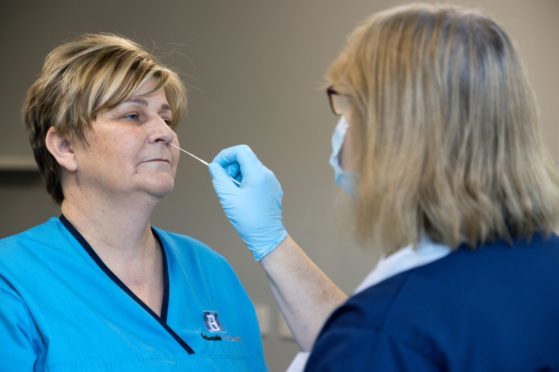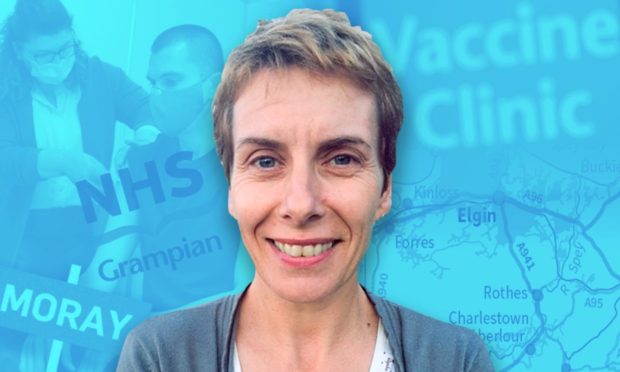Covid cases in the north have soared ninefold in the last two weeks, and quadrupled in the north-east, with the “alarming” figures forcing the cancellation of clinics and operations.
The surge in positive tests is thought to be linked to larger numbers of people socialising, and health bosses fear we are now experiencing a third wave of the coronavirus.
Jillian Evans, head of health intelligence at NHS Grampian, said it had caused “disruption” to hospital services with some procedures having to be cancelled due to staff self-isolating.
And she fears it could be too soon to continue with plans to ease further restrictions in the summer.
She said: “We’ve still got a long way to go before we can say we can comfortably start thinking about getting back to normal.
“It is really disappointing, it feels as if our messages of being careful are swimming against the tide of what’s happening when you look at national leaders talking about lockdown easing and getting back to normal in August – it feels to me as if we could be a way off that.”
The number of people diagnosed with Covid-19 has quadrupled in Grampian over the past two weeks. The latest statistics show 1,112 people had received a positive result over seven days last week compared to 233 in the second week of June.
And case numbers are nine times higher across the whole of the Highlands – rising from 60 new cases over the second week of June to 583 new cases last week.
Jillian described the figures as “absolutely alarming”. She said: “In Aberdeen city, they’re back to where we were in the early weeks of January, it really is significant.
“We are seeing widespread transmission. It’s predominately bad in the northern part of the city but looking at it over the past eight days or so it’s spreading out much wider than that now.
‘Cases have escalated quickly’
“There are bigger clusters emerging and the reason behind it is people mixing. We know that people are increasing the number of contacts they have, and they are allowed to do that – many people are behaving within the rules, they just happen to be meeting up more.
“We expected there to be an increase in cases. I think probably what’s taken us all by surprise in Scotland is just how quickly it’s gone up – it has escalated quickly.”
She said contact tracing teams in Grampian, and across the country, faced a “challenging” time and have changed the way they provide services as case numbers increase.
In Aberdeen, there were 650 new cases over seven days last week compared to 156 during the second week of June.
And statistics show there were 355 new positive cases on the mainland in the Highlands last week compared to the 28 new cases recorded two weeks before.
Jillian warned the increasing number of cases was affecting hospitals in Grampian.
She said: “We’re seeing a disruption to services, we’ve seen some operations cancelled, we’re seeing clinic appointments being cancelled.
“It really is disruptive. If the national modelling bears out in Grampian and you think that 5% of those may be hospitalised in the coming weeks then that’s a lot of patients.
‘Children will still be affected during the holidays’
“It’s gone up nine/tenfold in some parts of the country. So it feels as though our third wave has happened a little sooner than we expected.”
Children are still expected to be affected during the school summer holidays.
She said: “We’ve reached the end of the school term now so the disruption in schools and the sheer numbers of children who had to self-isolate with their families won’t be seen any more.
“But we are still going to see lots of kids still becoming infected because they’re still socialising. They’re not in school anymore but those kids will still get together and socialise and if infection is there it will spread quickly.”
Jillian said it was clear the “fantastic progress” of the vaccination programme was working with around 96% of people in Grampian now diagnosed with coronavirus now under the age of 55.
And 80% of cases diagnosed in the north-east over the past week involved people who either had not been vaccinated or had just had one dose.
‘It is particularly challenging right now’
She said contact tracing teams had faced a challenging time with the numbers of cases rising.
She said: “When numbers are so big, the effectiveness of contact tracing is really affected. It’s just simply not possible to do what we were doing when the numbers were so low, such as follow-up calls to people to support them when they have to self-isolate, so we’ve had to revert to text messages for close contacts simply because the numbers every day are too much to manage.
“We’ve had to change our contact tracing approach, adopt a risk approach to doing this. I know we’re not the only health board in Scotland having to try to manage this in a different way.
“It is particularly challenging right now.”
And she thanked communities affected by rising cases for their quick response to help prevent the spread of coronavirus.
She said: “Just to give a note of thanks to communities that we’ve been encouraging to come forward for testing in the last couple of weeks, and a particular mention to Tillydrone and Froghall, and Westhill in Aberdeenshire.
“We asked them to come forward for testing, even though they had no symptoms and they have come in their droves. People have really responded to that call to arms and that has been fantastic.”

